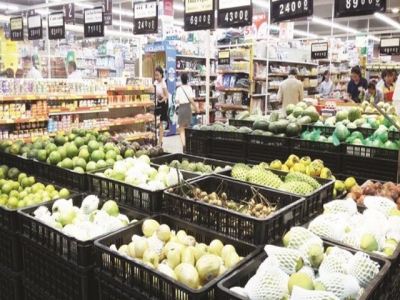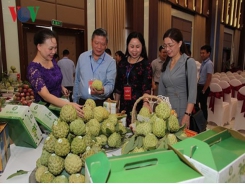Agricultural products are still struggling to enter supermarkets

Gradually confirmed the position of an exporting country of agricultural products with many items worth billions of USD, but Vietnamese agricultural products are struggling when competing in the domestic market, typically at the stage of bringing consumable goods into supermarkets and trade centers.
In order to make agricultural products enter the supermarkets, suppliers still have to accept high levels of discount. Picture: Nguyen Thanh.
Only 10% of clean agricultural products goes to supermarkets
According to the statistics of the management agency, the country has 9,000 markets, 800 supermarkets, 130 trade centers and about 4,000 mini supermarkets, self-service stores of domestic and foreign enterprises. The modern trade system is quite large and growing, but so far, the share of clean agricultural products in these trading systems is only 7-10%. This means that 80-90% of agricultural products are sold freely in markets, retail shops and street vending. In particular, there are all kinds of products, including high and low quality.
The number of clean agricultural products consumed at the supermarkets and trade centers mentioned above is too small compared to the production capacity of Vietnam. Prof. Dr. Dang Dinh Dao, former director of the Institute for Economic Research and Development (National Economics University, Hanoi), said that Vietnamese goods in general and Vietnamese agricultural products in particular are not involved in the large chain and distribution system. The foremost reason is the quality, brand goods which do not meet the standards in the distribution network. The quality, design and stability of Vietnamese products is very limited.
In this regard, Mr. Vu Vinh Phu, former president of the Hanoi Supermarket Association, said that production weakness is one of the reasons for the small number of clean agricultural products in the supermarket network. Another important reason is the lack of accountability of the distributor when offering high discounts to suppliers. The discount rate is up to 25-30%, plus other unreasonable costs. Therefore, many suppliers can not meet these terms, and clean agricultural produce is sold on the market, confused with non-standard goods.
“The first supermarket was opened by me, it only needs 30 minutes to check products once entering the supermarket and the average discount is 12.8%. While in Vietnam, at many conferences on the link between supply and demand, many enterprises have reflected on the inadequacies of bringing goods to the supermarket. Many supermarkets have large sales, have power to put pressure on the suppliers. For example, 10 units send vegetables to the supermarket, only 1-2 units are selected, and have to give high discounts. Even when their products are sold out, supermarkets say, “accountants are absent” to delay the payments to suppliers to save on capital outflow,” Mr. Phu said.
Need to legalize the stage of distribution
With Vietnamese goods in general, Vietnamese agricultural products are wedged, the road to supermarkets is too difficult, what are the consequences?
According to Mr. Phu, the first result is very clear that Vietnamese goods do not reach consumers in supermarkets. The second is that Vietnamese goods sold in supermarkets will be pushed up on price compared to reality. When goods prices are high they must compete fiercely with foreign goods, especially Thai goods. The third is that standard goods must struggle to enter the supermarket for a long time, which also eliminates the genuine production momentum. “Broadly speaking in this story is the issue of discounting, the issue of economic sharing, fair trade in Vietnam between buyers and sellers, between production and distribution. Now, it needs more discussions about the stages of distribution, to avoid manipulation in the retail sector,” Mr. Phu said.
Some experts said that it is important to legalize the distribution to solve the inadequacies in bringing the agricultural products into the supermarket in particular and removing bottlenecks in the distribution of goods in general in Vietnam. At present, Thailand has regulations on distribution of agricultural products, 70% of profit is from growers, but in Vietnam, farmers are still subject to many disadvantages. Besides, in order to open up the trade flow of commodities, it is necessary to reorganize large production according to the planning of each locality and each region, which has advantages for the development of each kind of agricultural product. At the same time, expanding the policy on land holdings, creating good conditions, applying mechanization into production in order to manage the quality of goods as well as reduce production costs.
According to Mr. Vu Vinh Phu, the important solution is to build production and distribution infrastructure to reduce the cost of production and circulation of agricultural commodities; to form a system of wholesale markets and a trading platform for agricultural products, so as to ensure the open and transparent trading and management of food safety. “Measures should be taken to support the stockpiling of agricultural products, post-harvest preservation, coupled with the rapid development of the modern trading system, and ending the proprietary forms of retail trade; invest sufficiently in the formation of strong corporations in production and distribution, with sufficient potential to develop large commodity production and develop a wide distribution network,” Mr. Phu said.
Related to this story, from the perspective of both supplying input agricultural materials and coordinating with businesses purchasing and selling agricultural products to farmers, Mr. Phan Minh Tam, Director of Marketing - Binh Dien Fertilizer Company expressed his wish: In the coming time, the Ministry of Industry and Trade will step up support for input supply units to connect with output units and farmers. Thus, businesses and farmers will have more advantages in producing and consuming agricultural products. “At the same time, in order to have a strong relationship, there must be benefit and risk sharing among parties. Farmers also need to share with affiliated companies. There are many cases, when coordinating, farmers themselves break the contract of cooperation when not producing according to standards that businesses demand,” said Mr. Tam.
Có thể bạn quan tâm
Phần mềm

Phối trộn thức ăn chăn nuôi

Pha dung dịch thủy canh

Định mức cho tôm ăn

Phối trộn phân bón NPK

Xác định tỷ lệ tôm sống

Chuyển đổi đơn vị phân bón

Xác định công suất sục khí

Chuyển đổi đơn vị tôm

Tính diện tích nhà kính

Tính thể tích ao hồ




 Tea pork farm makes a big hit in…
Tea pork farm makes a big hit in…  Expanding market of Yen Dung fragrant rice
Expanding market of Yen Dung fragrant rice